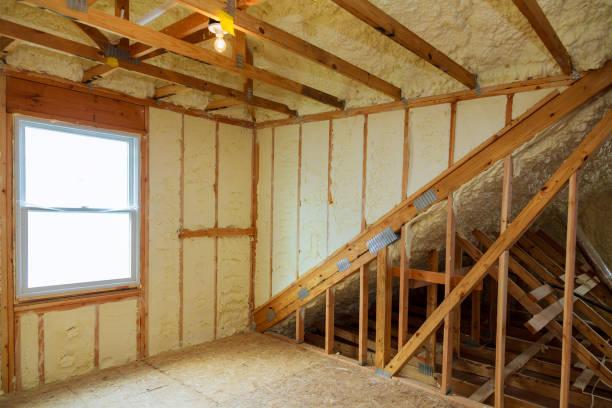When it comes to energy efficiency and home comfort, insulation plays a pivotal role. Among the various insulation options available, spray foam insulation stands out for its exceptional performance and versatility. But what exactly is spray foam insulation, and how does it work?
Spray foam insulation is a type of insulation material that is applied as a liquid and expands into a foam to fill gaps, cracks, and voids in walls, ceilings, and attics. It consists of two main components: isocyanate and polyol resin. When combined, these components react chemically to create expanding foam with excellent insulating properties.
Here’s a closer look at the key features and benefits of spray foam insulation:
- Expansive Coverage: Unlike traditional insulation materials like fiberglass or cellulose, which are installed in pre-cut pieces, spray foam insulation expands to fill every nook and cranny, creating a seamless barrier against heat loss and air infiltration. This expansive coverage ensures maximum energy efficiency and thermal performance.
- Air Sealing Properties: One of the most significant advantages of spray foam insulation is its ability to provide an airtight seal. By sealing gaps and cracks, spray foam prevents air leakage, which can account for significant energy loss in homes. A well-insulated and air-sealed home maintains more consistent indoor temperatures and reduces the workload on heating and cooling systems.
- High R-Value: R-value is a measure of an insulation material’s thermal resistance—the higher the R-value, the better the insulation’s ability to resist heat flow. Spray foam insulation typically has a higher R-value per inch compared to other insulation materials, making it an excellent choice for achieving superior thermal performance in limited space.
- Moisture Resistance: Spray foam insulation is resistant to moisture infiltration, which can help prevent mold growth, rot, and structural damage in the building envelope. The closed-cell structure of some types of spray foam acts as a moisture barrier, protecting the underlying surfaces from water damage and humidity.
- Longevity and Durability: When properly installed, spray foam insulation can last for decades without degrading or losing its insulating properties. Unlike traditional insulation materials that may settle or deteriorate over time, spray foam maintains its integrity and effectiveness for the life of the building.
- Sound Dampening: In addition to thermal insulation, spray foam also provides soundproofing benefits by reducing airborne noise transmission through walls and floors. The dense structure of spray foam helps absorb sound vibrations, creating a quieter and more comfortable indoor environment.
- Environmental Benefits: Spray foam insulation can contribute to energy savings and reduce greenhouse gas emissions by decreasing the need for heating and cooling energy. Additionally, some spray foam formulations use eco-friendly blowing agents that have lower global warming potential, making them more environmentally sustainable.
In conclusion, spray foam insulation offers a comprehensive solution for improving energy efficiency, indoor comfort, and structural integrity in residential and commercial buildings. Its versatility, performance, and long-term benefits make it a preferred choice for architects, builders, and homeowners seeking optimal insulation solutions for their properties. Whether used in new construction or retrofits, spray foam insulation delivers unmatched insulation performance and enhances the overall quality of the indoor environment.
